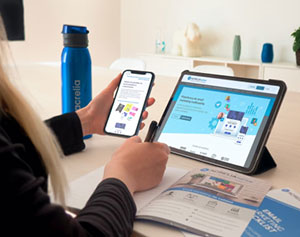Five Principles for Success from a Leading Voice in Healthcare Marketing

Blog post By Paula Chiocchi on 2025-11-05
Healthcare marketers play a critical role in one of the most complex, highly regulated industries in the world. It’s a role that requires a blend of strategic discipline, empathy, and compliance awareness, and a mix of left- and right-brain qualities. That’s why I found my recent B2B Influence conversation with Aaron Strout, marketing strategist and former CMO of Real Chemistry, so insightful.
Aaron, who is the host and executive producer of the Reaching Higher Podcast, shared a wealth of real-world experience about how successful healthcare brands balance personalization, privacy, creativity, and compliance—while still connecting meaningfully with patients and providers.
Here are five principles from Aaron that offer clear direction for healthcare marketers working to navigate today’s complex and rapidly evolving landscape:
1. Data Responsibility Starts with Patient Trust
Aaron emphasized that healthcare brands must uphold the spirit of the Hippocratic Oath—not just for providers, but in how data is handled. At companies like Real Chemistry and Swoop, patient data is anonymized and tokenized to protect identities while enabling precise targeting.
This means marketers can reach individuals affected by specific conditions without ever knowing their names or personal details. It’s a model of ethical personalization—and a reminder that trust is earned through transparency, compliance, and safeguarding data at every step.
As cookie deprecation and data-privacy regulations tighten, this approach is becoming essential across all industries—but in healthcare, it’s foundational.
2. Creativity Thrives Within Constraints
Aaron admitted he once resisted healthcare marketing because of its heavy compliance burden. Over time, though, he came to admire the creativity that emerges from constraint. With strict regulations on messaging, claims, and even image use, healthcare marketers must think differently.
The challenge, he said, is what makes the work so meaningful. Teams that succeed learn to deliver emotionally resonant, compliant campaigns that educate and inspire—without sensationalism or shortcuts.
This level of disciplined creativity sets healthcare marketing apart. It’s proof that doing good work under tight guardrails isn’t just possible—it’s what builds credibility and societal impact.
3. Measuring Success Means Looking Beyond the Clicks
Traditional marketing metrics don’t always tell the full story in healthcare. Aaron noted that outcomes often reflect behavior change, access to care, or adherence—not clicks or impressions.
He shared how “script lift” metrics—tracking increases in prescription rates following campaign exposure—helped quantify results for pharma brands. But he also highlighted the growing role of social listening and qualitative insights.
By analyzing unbranded discussions across platforms like Reddit or TikTok, marketers can assess how education efforts shift perceptions, awareness, and engagement over time. These deeper indicators reveal how well campaigns actually help patients and providers; not just how many people see them.
4. Advocacy and Education Create Real Relationships
Healthcare marketing works best when it moves beyond transactions to build advocacy and thought leadership. Aaron described how partnerships with organizations like the American Cancer Society or the Tigerlily Foundation can deepen a brand’s purpose and extend its reach.
When companies support advocacy initiatives—helping patients access care, navigate post-treatment recovery, or manage mental health—they earn long-term loyalty that advertising alone can’t buy.
Equally important is medical education. Many physicians, he noted, rely on healthcare companies for updates on new treatments. Brands that provide transparent, research-backed learning resources become trusted partners—not just vendors.
That shift from vendor to partner is the hallmark of modern healthcare marketing: it’s about shared outcomes, mutual respect, and serving the greater good.
5. The Future Belongs to Adaptive, Data-Fluent Brands
Aaron stressed the importance of embracing innovation responsibly as a healthcare marketer. From influencer collaborations to generative AI, new tools can amplify reach and insight—but only when used with empathy and compliance at the core. He said that healthcare’s future will reward brands that combine rigorous data ethics with agility, authenticity, and adaptability.
When asked what advice he’d give to a healthcare brand launching a new product or entering a new therapeutic space, Aaron didn’t hesitate. Success, he said, starts with knowing your audience and landscape—demographics, economics, language, and cultural context all shape communication strategy.
With audience building being one of our most in-demand services at OMI, we couldn’t agree more. In fact, for those looking to market to healthcare professionals, the OMI Physician & Allied Health database offers full data records including email and covers all facets of the healthcare industry, from doctors, nurses, and specialty physicians to back office staff and more. Marketers can integrate direct mail, email, social and programmatic with digital intent signals for precision audience targeting and analytics. OMI also ties in consumer audiences based on intent for those organizations that market healthcare products and services. Read more here.
Healthcare marketing is no easy feat. As Aaron said, it demands equal parts science, creativity, and humanity. For marketers entering or evolving within this sector, the opportunity is enormous. The world’s most impactful healthcare campaigns are those that educate, advocate, and empathize—while respecting the privacy and dignity of every individual they reach.
Go here to listen to the B2BInfluence Podcast interview with Aaron, and reach out to our team at request@outwardmedia.com for guidance and assistance with your audience-building and campaign management needs, whether you’re In healthcare or another industry. We look forward to talking with you!
DOWNLOAD YOUR FREE ebook
At OMI, we believe good things happen when you share your knowledge. That's why we're proud to educate marketers at every level - in every size and type of organization - about the basics of email marketing and the contact data that powers it.
-
The Executive's 15-Minute Guide to Building a Successful Email Marketing Database
-
A 15-Minute Guide to Fortune 2,000 Businesses and Executives
-
Five Best Practices for Using Email Marketing to Target SMBs



